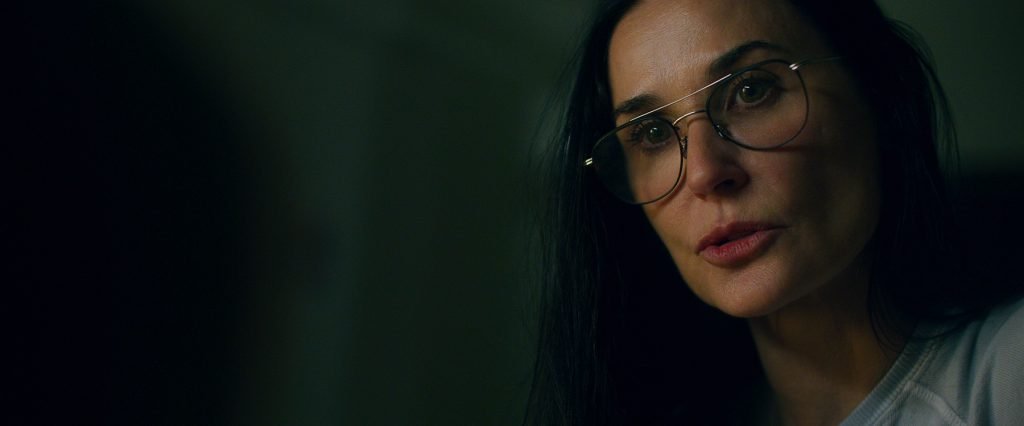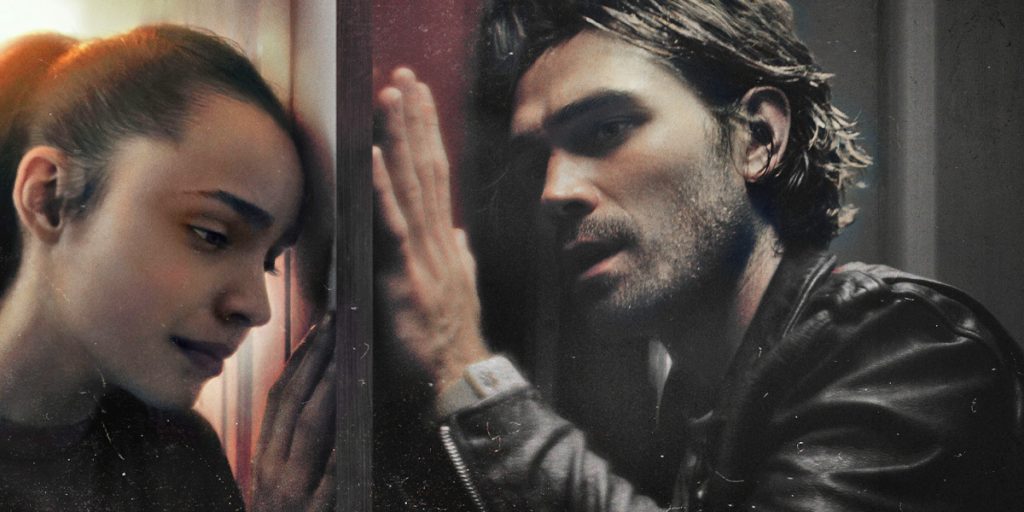Songbird is certainly not a good film, but it is an amusing enough trashy B-movie that stands as a fun Hollywood footnote.
Conceived, written, and filmed in the early days of the end of COVID lockdown in Los Angeles this past summer, Songbird is perhaps the first true “post-COVID” film. Songbird flashes forward to the year 2024 as COVID-23, yet another mutation of our current pandemic foe, ravages the population. In the film’s vision, Los Angeles has entered a sort of permanent post-apocalyptic police state fervor with refugee camp-esque “Q-Zones” housing exposed individuals. A small subset of the population is granted a wrist band denoting that they are immune to the ravages of the mutated disease and its 50% fatality rate.
In a way, I suspect it was always inevitable that the first types of COVID stories we would get would be horror films or romance films. The lens of horror lets viewers directly confront the traumas of the past months, while romance provides the escapism – and human contact – lost to various lockdowns. Many appear to have taken a very cynical view of Songbird as profiteering off a pandemic as though there isn’t a long history in entertainment medium of capitalizing off global events. Perhaps the presence of shock auteur Michael Bay as a producer has gotten hackles up, but nothing here is all that offensive. Songbird is not overwhelmingly more cynical or exploitative than past B movies. From propagandistic war films and 50s sci-fi junk like The Killer That Stalked New York (inspired by then recent small pox outbreaks) to more serious literature like 1925’s The Painted Veil consideration of the impact of the Spanish Flu through the lens of cholera, artist have always sort to profit off of viewers interest in – and fear of – recent history.
Despite a runtime of only around 80 minutes, Songbird manages to weave together about a half dozen stories with an array of surprisingly famous faces. At heart, the film is mostly just a dopey love story. The film’s core narrative revolves around the love story between K.J. Apa (Riverdale) and Sofia Carson (Disney’s Descendants). Through circumstances left largely unclear, the pair – a COVID immune courier and a caretaker for her elderly grandmother – are passionately in love despite never actually meeting in person, a byproduct of nearly four years of lockdown. Apa and Carson have good chemistry and both manage to make the best of some extremely stock lovey dovey language.

The rest of the cast is populated by familiar faces like Craig Robinson (Morris from America), Bradley Whitford (Get Out), Alexandra Daddario (True Detective), Paul Walter Hauser (Richard Jewell), and Demi Moore (Ghost). Peter Stormare gets the most to do as a Department of Sanitation enforcer. The Sanitation Department has grown into something of a gestapo in the film’s world. The film’s various stories intersect in ways that feel both hopelessly contrived and totally encumbered by the realities of filming in a pandemic.
There are some smart little design touches here. The wealthy are able to remain at home and have whatever non-essentials they desired delivered through UV package drop portals. The poor seem left to wait for government aid. In many ways, the film echoes the first entry in The Purge franchise. A good horror/thriller idea that fails to really connect because the film chooses to take too limited a view of the story’s world. Even a lazy mulling of the film’s plot uncovers significant holes and logical gaps. And in some ways the film already feels outdated, as Americans face infections rates far greater than at any point in the pandemic, lockdowns have all but disappeared. The film’s universe, where lockdowns could become so extreme, is almost quaint compared to the flippant behavior of real Americans. I could attempt to derive a politicized message from the film, but I’m not sure the story was even thought through that thoroughly.
Personally, I am constantly worried about the movie industry’s health after COVID. From the disruptive effect of the Warner Bros 2021 calendar moving to HBO Max to the fiscal health of movie theater chains, I fret we will never have a return to anything even remotely resembling the old normal. I even felt touched by a small scene in Songbird that sees two characters reminisce about the theatrical experience. And so I perhaps enjoyed Songbird more than it deserves. It was nice to see a trashy horror movie with a vaguely famous cast and that glossy unreal sheen of a Big Hollywood movie that is rarely found on the various streaming services. It’s not high art – frankly, it’s barely art at all – but it feels like the sort of movie that may not exist, especially in theaters, in just a few years.
If we have learned anything from Taylor Swift over the last few months, it’s that some artists are creating remarkable work in the crucible of COVID’s lockdown. Soon I suspect we will have a panoply of excellent stories about and derived from the pandemic experience. Unfortunately, Songbird is not close to our first great bit of COVID inspired cinema, but is an amusingly dumb trifle.

